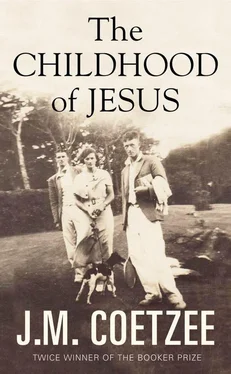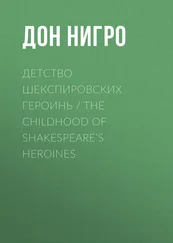‘The idea of justice, for instance. We all desire to live under a just dispensation, a dispensation in which honest toil brings due reward; and that is a good desire, good and admirable. But what we are doing here at the docks will not help to bring about that dispensation. What we do here amounts to no more than a pageant of heroic labour. And that pageant depends on an army of rats to keep it going — rats who will work night and day gobbling down these tons of grain we unload so as to make space in the shed for more grain. Without the rats the pointlessness of our labour would be laid bare.’ He pauses. The men are silent. ‘Don’t you see that?’ he says. ‘Are you blind?’
Álvaro looks around. ‘The spirit of the agora,’ he says. ‘Who is going to respond to our eloquent friend?’
One of the young stevedores raises a hand. Álvaro nods to him.
‘Our friend invokes the concept of the real in a confusing way,’ says the young man, speaking fluently and confidently, like a star student. ‘To demonstrate his confusion, let us compare history with climate. The climate we live in, we can agree, is greater than we. None of us can ordain what the climate shall be. But it is not the quality of being greater than us that makes climate real. Climate is real because it has real manifestations. Those manifestations include wind and rain. Thus when it rains we get wet; when the wind rises our caps get blown off. Rain and wind are transitory, second-order realities, such as are accessible to our senses. Above them in the hierarchy of the real sits climate.
‘Consider now history. If history, like climate, were a higher reality, then history would have manifestations which we would be able to feel through our senses. But where are these manifestations?’ He looks around. ‘Which of us has ever had his cap blown off by history?’ There is silence. ‘No one. Because history has no manifestations. Because history is not real. Because history is just a made-up story.’
‘To be more accurate’ — the speaker is Eugenio, who yesterday wanted to know whether he would prefer to work in an office — ‘because history has no manifestations in the present. History is merely a pattern we see in what has passed. It has no power to reach into the present.
‘Our friend Simón says that we should get machines to do our work for us, because history so ordains. But it is not history that tells us to give up honest labour, it is idleness and the lure of idleness. Idleness is real in a way that history is not. We can feel it with our senses. We feel its manifestations each time we lie down on the grass and close our eyes and vow we will never get up again, even when the whistle blows, so sweet is our pleasure. Which of us, loafing on the grass on a sunny day, will say, I can feel history in my bones telling me not to get up ? No: it is idleness that we feel in our bones. That is why we have the idiom: He does not have an idle bone in his body .’
As Eugenio has spoken he has grown more and more excited. Perhaps out of fear that he will never stop, his comrades interrupt him with a round of applause. He pauses, and Álvaro grasps the opportunity. ‘I don’t know whether our friend Simón wants to respond,’ he says. ‘Our friend dismissed our labours here as a useless pageant, a remark which some of us may have found hurtful. If the remark were merely unconsidered, if on further reflection he would like to withdraw or amend it, I am sure the gesture would be appreciated.’
His turn. The tide is against him, unmistakably. Does he have the will to resist?
‘Of course I withdraw my thoughtless remark,’ he says, ‘and apologize moreover for any hurt it may have caused. As for history, all I can say is that while today we may refuse to heed it, we cannot refuse for ever. Therefore I have a proposal to make. Let us gather again on this wharf in ten years’ time, or even in five years’ time, and let us see then whether grain is still being unloaded by hand and being stored in sacks in an open shed for the sustenance of our enemies the rats. My guess is that it will not.’
‘And what if you are proved wrong?’ says Álvaro. ‘If in ten years’ time we are still unloading grain exactly as we do today, will you concede that history is not real?’
‘I will indeed,’ he replies. ‘I will bow my head to the force of the real. I will call it submitting to the verdict of history.’
For a while, after his speech against the rats, he finds the atmosphere at work constrained. Though his comrades are as kindly as ever, a hush seems to fall when he is around.
And indeed, as he looks back on his outburst, he flushes with shame. How could he have belittled the work of which his friends are so proud, work in which he is grateful to be allowed to join?
But then gradually things become easier again. During a morning break Eugenio comes up to him proffering a paper bag. ‘Biscuits,’ he says. ‘Take one. Take two. A gift from a neighbour.’ And when he expresses his appreciation (the biscuits are delicious, he can taste ginger in them and perhaps cinnamon too), Eugenio adds, ‘You know, I’ve been thinking about what you said the other day, and maybe you have a point. Why should we feed rats when they do nothing to feed us? There are some people who eat rat, but I certainly don’t. Do you?’
‘No,’ he says. ‘I don’t eat rat either. I much prefer your biscuits.’
At the end of the work day Eugenio returns to the subject. ‘I have been worried that we might have hurt your feelings,’ he says. ‘Believe me, there was no animus. We all feel the utmost goodwill towards you.’
‘I am not hurt at all,’ he replies. ‘We had a philosophical disagreement, that is all.’
‘A philosophical disagreement,’ agrees Eugenio. ‘You live in the East Blocks, don’t you? I’ll walk with you as far as the bus stop.’ So to keep up the fiction that he lives at the Blocks he has to accompany Eugenio to the bus stop.
‘There is a question that has been preoccupying me,’ he remarks to Eugenio as they wait for the Number 6 bus. ‘It is entirely non-philosophical. How do you and the other men spend your free time? I know many of you are interested in football, but what about the evenings? You don’t seem to have wives and children. Do you have girlfriends? Do you go to clubs? Álvaro tells me there are clubs one can join.’
Eugenio colours. ‘I don’t know anything about clubs. I go to the Institute, mainly.’
‘Tell me about that. I have heard mention of an Institute, but I have no idea of what goes on there.’
‘The Institute offers classes. It offers lectures, films, discussion groups. You should join up. You would enjoy it. It’s not just for young people, there are lots of older people too, and it’s free. Do you know how to get there?’
‘No.’
‘It’s on New Street, near the big intersection. A tall white building with glass doors. You have probably passed by many times without knowing. Come tomorrow night. You can join our group.’
‘All right.’
As it turns out, the course in which Eugenio is enrolled, along with three other of the stevedores, is on philosophy. He takes a seat in the back row, apart from his comrades, so that he can slip out if he gets bored.
The teacher arrives and silence falls. She is a woman of middle age, rather dowdily dressed, to his eye, with tightly cropped iron-grey hair and no make-up. ‘Good evening,’ she says. ‘Let us resume where we left off last week, and continue our exploration of the table — the table and its close relative the chair. As you will remember, we were discussing the diverse kinds of table that exist in the world, and the diverse kinds of chair. We were asking ourselves what unity lies behind all the diversity, what it is that makes all tables tables, all chairs chairs.’
Читать дальше












